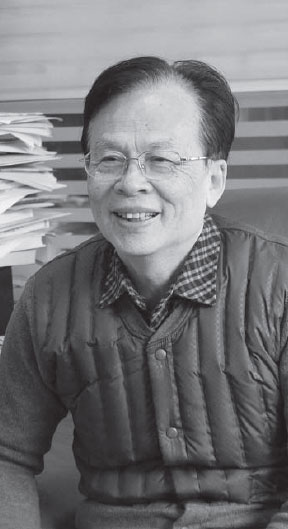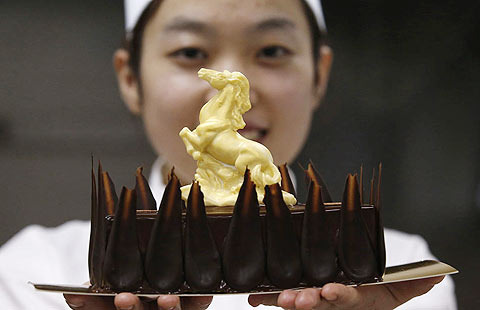Quest for speed drives top quantum scientist
Updated: 2014-01-29 08:47
By Zhu Lixin in Hefei, Anhui (China Daily)
|
|||||||||||
When he was named the 2013 CCTV Technology Innovation Person of the Year for his distinguished contribution to research on the quantum computer, Guo Guangcan felt rather surprised.
The award committee told him just days before the ceremony, which was held on Dec 29, that he was one of only two winners elected by netizens nationwide.
"I was wondering how a scientist of quantum technology could draw so much attention online," says Guo.
It may be because netizens are by definition on computers - and always looking for the Next Big Thing. Quantum computers will use the power of atoms to perform memory and processing tasks far faster than silicon-based computers.
The 71-year-old Guo is now a member of the Chinese Academy of Sciences and one of the top scholars in the University of Science and Technology of China. He's overjoyed that his long-cherished dreams have been finally fulfilled - not in the award itself, but in the popularization of quantum technology in China, especially among the young talents.
Guo entered the department of radio electronics at USTC in the 1960s, and he stayed there as a teaching assistant after graduation.
His initial research was focused on laser technology, but he surprised his scientist friends with his jump from lasers to quantum optics after the "cultural revolution" (1966-76), a period which stalled the country's scientific development.
He got no support for his research shift at first. "Nobody in China had ever considered the possibility of solving optics problems with quantum theories before, but I believed that this new field could be very interesting," Guo says.
Guo went to the physics department at the University of Toronto as a visiting scholar in 1981, when he was surprised to find research on quantum optics in some developed countries had begun 20 years earlier. "I realized the other countries had already formed a mature theoretical framework on quantum optics," he says. When the Fifth International Quantum Optics Conference was held at the US-based University of Rochester in 1983, eight young scientists who had very limited grasp of the field were the only Chinese in attendance.
"After the conference, we eight young Chinese held another meeting of our own, which lasted till as late as 2 am." The young men agreed that Chinese scientists should have their own voice in the world's quantum research.
As the first among the eight to return to China, Guo organized the country's first academic conference on quantum optics in 1984 with the support of USTC, the Hefei-based university that employed him. The conference, which has become regular since then, plays a vital role in strengthening the discipline and the research in China.

Guo also set up the nation's first quantum optics course at USTC and published the country's first textbook of the field based on his lectures.
By the 1990s, Guo was preparing for another transition. "The road of quantum optics research will inevitably lead to quantum information, an interdisciplinary field which I think would have more academic vitality," says Guo of the quest for a quantum computer. He has always believed exploring new scientific fields to be far more important than following the existing hot spots.
In 1997, Guo achieved a major breakthrough in quantum coding, which has revolutionized the field of information theory. His project has become part of the country's 973 Program under the Ministry of Science and Technology. His project has more than 50 scientists from more than 10 academic institutions nationwide.
"This top-notch quantum scientist group will play a vital role in the future development of China's quantum technology," says Guo, who is now the director of the Hefei-based Key Laboratory of Quantum Information under the Chinese Academy of Sciences.
As China, the US and other major powers are racing to develop the first quantum computer, he says Chinese scientists are going all out to win the championship. "A quantum computer can revolutionize humans' lives as the electronic one has been doing in the past decades," says Guo excitedly.
A quantum computer could, as the theory goes, carry out millions of calculations simultaneously, according to Guo, who dreams of developing the world's first quantum chip.
zhulixin@chinadaily.com.cn
|
Guo Guangcan has a long-cherished dream of popularizing quantum technology in China. Fan Qiong / for China Daily |
(China Daily 01/29/2014 page20)
Today's Top News
Experts call for detailed H7N9 rules
HK confirms H7N9 case, to cull 20,000 poultry
Chinese President to visit Paris to boost ties
China and EU to boost political trust
US urges Japan to apologize
Int'l hacker got caught in China
More than 300 fall ill on Royal Caribbean ship
8.8% salary hikes expected for 2014
Hot Topics
Lunar probe , China growth forecasts, Emission rules get tougher, China seen through 'colored lens', International board,
Editor's Picks

|

|

|

|

|

|






